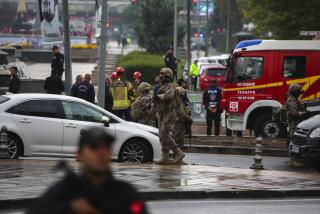Turkey Threatens Its Own Intervention in Iraqi North
- Share via
ANKARA, Turkey — A big loser in new regional tumult, Turkey on Wednesday threatened new armed intervention of its own against separatist guerrillas in northern Iraq and demanded compensation for American derailing of an Iraqi oil-for-food plan.
A key pillar in the U.S.-led coalition against Iraqi dictator Saddam Hussein during the 1991 Persian Gulf War, the Turks have long complained about the bitter aftermath for them. Now, under Prime Minister Necmettin Erbakan, a conservative Islamist who seeks better ties with both Iran and Iraq, they are chafing openly at the security and economic costs of new unrest.
On Wednesday, Turkey signaled that military preparations were underway for a cross-border raid against Turkish Kurdish rebels sheltering in areas of northern Iraq controlled by feuding Iraqi Kurds. And Foreign Minister Tansu Ciller wrote President Clinton asking for help in minimizing Turkish losses as the country continues to respect the United Nations embargo against neighboring Iraq.
“Turkey’s losses have to be compensated one way or the other,” Foreign Ministry spokesman Omer Akbel said.
Representatives here of the two main Iraqi Kurdish parties said they were summoned to the Foreign Ministry on Wednesday morning and warned of Turkish concerns that guerrillas of the Kurdistan Workers Party (PKK) were taking advantage of their dispute.
Ciller told reporters: “Intelligence has reached us that the PKK is massed at our border. We have to stop the infiltrations and maintain our security. Necessary measures will be taken.”
Such public warnings have usually presaged strikes into northern Iraq against the Syrian-supported PKK, which has battled government forces in the Turkish southeast for more than a decade in quixotic hopes of winning independence for Kurdish areas.
A Foreign Ministry official said later Wednesday that no operation was underway and that Ciller’s remarks were a warning. “We respect Iraq’s territorial integrity and political unity,” he said.
Turkey believes that a power vacuum in northern Iraq not only gives the PKK a base but also raises the unacceptable threat of a Kurdish state on Turkey’s border.
Increased Turkish military movements since Iraq’s weekend attack on its mostly Kurdish northern city of Irbil have led to impromptu clashes between Turkish forces and PKK bands within Turkey. The government says 69 rebels and three soldiers have been killed.
Turkey and Iran regularly vow to respect Iraqi sovereignty. But since Baghdad’s control of the Iraqi north lapsed after the Gulf War, both have mounted expeditions against Kurdish enemies there. Typically, the incursions draw little public comment outside the region.
In the mid-1980s, Turkey signed an accord with Hussein that let its troops go up to 12 miles into Iraq in hot pursuit of the PKK. Since the Gulf War, Turkish forces have made such incursions repeatedly. In March 1995, 35,000 Turkish soldiers marched into northern Iraq against the PKK and stayed there for five weeks. In July, 8,000 PKK-hunting troops crossed the border.
Also this summer, Iran sent an armored column with artillery into northern Iraq to attack rebel Iranian Kurds. Diplomatic sources say perhaps 200 Iranian Revolutionary Guards remain in the northern Iraqi city of Sulaymaniyah. Iraq’s Patriotic Union of Kurdistan (PUK), which is headquartered in the city, says there are no Iranians there or in any other areas it controls along the Iranian frontier.
In writing to Clinton about oil on Wednesday, Ciller, a former prime minister, said that, by respecting the embargo against Iraq, Turkey has lost nearly $30 billion in trade since the Gulf War. In part to aid Turkey, the United States sponsored a U.N. plan that would let Hussein export $2 billion worth of oil every six months for the purchase of food and medicine.
Under the plan, much of the oil would be pumped through a pipeline in Turkey that has been closed since 1990, when Iraqi troops invaded Kuwait. Besides transit fees, Turkey expected to benefit through sales of food and medicine.
The oil shipments were to have begun this month. But Clinton, seeking economic as well as military pressure against Hussein, put the agreement on hold “until we are sure that these humanitarian supplies can actually get through to those who need them.”
The Turks see the delay as loss atop loss, Ciller said Wednesday, adding: “Turkey will take serious measures to prevent such losses.”
Erbakan--in turning secular, Western-looking Turkey more toward its Islamic neighbors--recently sent two Cabinet ministers to Baghdad to see Hussein and journeyed himself to Tehran, where he signed a $23-billion natural gas accord with the Iranians.
Turkey has asked the U.N. to be exempted from helping enforce the sanctions against Iraq, but a decision on that request was deferred until after the oil-for-aid arrangement was to go into effect. The losers now, in addition to the Turks, include the Iraqi Kurds, who would receive about 15% of the revenues as food, medical and community aid.
The conflict in northern Iraq has also hurt France and Russia, which expected to benefit from U.N.-approved food-for-oil deals with Iraq; Moscow also eventually would be helped by a lifting of international sanctions against Hussein’s regime.
In Moscow, officials said Iraq is ready to repay its $7-billion debt to Russia in the form of oil and hard currency when sanctions are lifted and that Russian companies are ready to build power stations, a steel plant and chemical factories in Iraq. Russian officials expect that trade with Iraq could climb to $1 billion a year.
Times staff writer Richard Boudreaux in Moscow contributed to this report.
More to Read
Sign up for Essential California
The most important California stories and recommendations in your inbox every morning.
You may occasionally receive promotional content from the Los Angeles Times.









